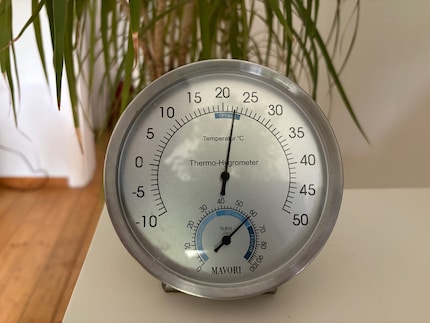
Product test
Small sensor, big impact: measuring CO₂ with the «Wuerfeli»
by Martin Jungfer

As an unsuspecting Brit, I made the costly mistake of ignoring room ventilation regulations when I first moved to Germany. I’ve since wised up – and become a true «lüften» enthusiast.
It’s a frosty winter morning in 2017 and I’m sitting in a classroom, grappling with tricky German grammar. Two hours into the day’s language lesson, my integration course teacher announces it’s time for a quick break. She then starts making her way around the room, throwing each window wide open as she goes. A chilly gust of air billows inside, making my classmates tug their jackets around their shoulders for warmth. «Can’t we keep the windows closed?» one woman asks. Having recently immigrated from Brazil, she isn’t used to the bracing South German winters yet. «No, the air in here is...stale,» the teacher says. Shivering, we all exchange looks over our textbooks, utterly perplexed by her behaviour.
As it turns out, my former teacher wouldn’t be the only German to exhibit this curious love of opening windows – or as they’d call it, «lüften». Back when I was teaching Business English to (mostly German) office workers, I’d observe the same thing. When a lesson reached its halfway point, someone would make a beeline for the windows, no matter how chilly it was outside. Sometimes, they’d comment on the stuffiness of the room, causing everyone else to nod vigorously in agreement. I joked with my integration course mates that Germans must have air-quality sensors built into their noses from birth – a notion apparently shared by expat TikToker Liam Carpenter.
In «Deutsche Welle’s» cult segment Meet the Germans, journalist Rachel Stewart mentions «lüften» in a similar vein. She recommends that expats «practise their draught chat», adding, «in whatever context, be it at a party or in the office, Germans absolutely love to talk about draughts and the various stages of airing a room». Expats, by contrast, will typically grumble about their German or Swiss partner’s penchant for letting an arctic gale into the bedroom just when it’s time to get cosy.
I initially chalked all of this up to cultural differences. For one thing, there’s a huge emphasis on fresh air when it comes to health and wellbeing in Germany and Switzerland. Both countries have a tradition of so-called air spas, resorts located in areas with a supposedly health-boosting climate. These initially emerged in the 19th century as a treatment for tuberculosis, but doctors still prescribe stays in such spas today. Under certain conditions, your health insurance might even cover some of the costs (linked page in German). In the Balkans, on the other hand, things couldn’t be more different. Being exposed to the cross breeze created by two open windows – known in some countries as «promaja» – is said to be responsible for all sorts of ailments, from muscle stiffness to colds to misfortune. When he was interviewed by the BBC about the dreaded spectre of «promaja», Serbian linguist Ivan Klajan said, «Nowhere else in the world do they have our fear of draughts».

Cultural attitudes aside, sticklers for indoor air quality are technically following official government advice. On its website, Germany’s Federal Environment Agency gives detailed recommendations on how to properly air out a room: «During the cold season, depending on the temperature and wind, airing out each room two to three times a day for approximately five minutes with one or more windows wide open is sufficient to ensure adequate ventilation.»
German rental agreements commonly include a section telling you exactly how often to open your windows per day and for how long. Meanwhile, landlords are entitled to inspect rental properties to make sure they’re being «aired correctly» and send written warnings to tenants who don’t comply. In 2016, a court in Bad Neustadt even ordered a tenant to pay their landlord almost 5,000 euros in damages. The reason? «Incorrect ventilation» had turned the flat into a breeding ground for mould (linked pages in German).
In Switzerland, it’s a similar story. The country’s health authority calls room airing «a prerequisite for good indoor air quality, intellectual performance, health and well-being» in the preamble of its eleven-page pamphlet on proper airing technique. As Switzerland’s premiere online retailer, Galaxus does pretty well out of its air-conscious customer base. Last year, sales of dehumidifiers soared by 91 per cent, a boom «driven by new buildings with improved insulation».
Our editorial team also regularly tests products such as air quality sensors and air purifiers, often attracting a large readership.
If you grew up in Germany or Switzerland, you’re probably wondering why we expats are making such a fuss over this banal, common-sense part of your daily routine. The thing is, different countries have different climates, different architecture and, as a result, different ventilation habits. As the trade journal Energy and Buildings points out: «German homes generally have no natural ventilation. Older, draughty windows have largely been replaced over the past 40 years with more energy-efficient, air-tight windows.» When a confused AirBnB host from Sweden posted a Reddit thread entitled «Why do Germans keep opening my windows?», users rightly pointed out that the lack of air flow in German buildings causes mustiness, condensation and mould if your window-opening game isn’t on point. As Galaxus reported at the peak of 2024’s rush on dehumidifiers, the same applies in Switzerland: «Modern houses and flats are designed for energy efficiency. They’re sealed down to the last windowpane to save heat and electricity.»
By contrast, the UK is reported to have «the oldest housing stock in Europe». Older buildings tend to be draughty and poorly insulated, shifting people’s focus from air circulation to conserving precious heat. In other words, nobody attempting to «lüft» in an office or classroom on a wintry day in Scotland would win any popularity contests. Meanwhile, in hotter climates, architectural features such as solar chimneys and wind catchers help to keep air circulating, cool buildings down and reduce the need for a strict «lüften» routine.
When you move to a foreign country, learning the language and finding a job tends to take priority over studying new room ventilation techniques. Much like influencer Uyen Ninh, my own lax approach to «lüften» came back to bite me during my first winter in Germany. Condensation plus a lack of air flow caused black mould to sprout up around our bedroom window frame. Despite attacking it with a chlorinated spray, many of the spores simply refused to die, and we ended up shelling out for a professional to remove the mould.
Needless to say, we won’t be making that mistake again. Although my husband and I have now been well and truly schooled on correct «lüften» protocol, we still bought ourselves a hygrometer to help us keep an eye on our indoor air quality. Fun fact: unsurprisingly, it was a Swiss dude who invented the world’s first hygrometer using human hair. The hair-free version is a good option if you haven’t yet developed one of those in-nose sensors that Germans and Swiss people seem to possess. If you get a «humid» reading, it could be time to crack those windows open.

But the art of «lüften» isn’t just about keeping mould at bay. Like much of the German-language press, I couldn’t help scoffing when a blogger from the US gushingly called room-airing «the German fall ritual you need to try ASAP!» In fairness, though, she wasn’t exactly wrong. Poor ventilation can raise indoor CO₂ levels, potentially causing headaches, drowsiness and difficulty concentrating. What’s more, letting indoor pollutants build up can aggravate allergies and cause minor respiratory illnesses.
I've now come to appreciate the jolt of indoor freshness I get from daily «lüften» sessions at home. Even if it does occasionally involve slinging on an extra jumper and blocking all the doors from slamming in the wind. Plus, bagging an «optimal» reading on the hygrometer gives me a sense of smug satisfaction. In a small way, it feels like unlocking a new level in the game of assimilating into German culture.
Have you mastered the art of airing out a room? Or has your subpar «lüften» game left you with a mould issue? Do you live in fear of «promaja»? Let me know in the comments.
Originally from Scotland, Kate joined the team as an English translator after stints as a journalist, press officer and ESL teacher. Since leaving her homeland for Germany in 2017, she's been gallivanting around the country, navigating the linguistic challenges and cultural faux pas that inevitably come with it.
Interesting facts about products, behind-the-scenes looks at manufacturers and deep-dives on interesting people.
Show all
Background information
by Michael Restin

Background information
by Martin Jungfer

Background information
by Anna Sandner